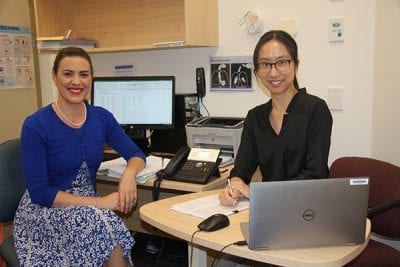Virtual care clinic improves outcomes for heart failure patients
An innovative model of care is providing timely access to vital medication assessment and education for patients diagnosed with heart failure through the introduction of virtual care.
The Prince Charles Hospital (TPCH) Heart Failure Clinic, jointly run by Nurse Practitioner Haunnah Rheault and Clinical Pharmacist, Karen Chan and supported by cardiologists, Dr Yee Weng Wong and Dr Alex Dashwood changed its usual face-to-face outpatient clinic visits to reduce exposure and possible transmission of COVID-19 and allow patients to keep receiving care while at home via the use of telephone and videoconference.

TPCH Heart Failure Clinic Nurse Practitioner Haunnah Rheault (left) and Pharmacist, Karen Chan (right) are helping patients obtain access to vital medication assessments through their new virtual care clinic
Heart Failure Clinical Pharmacist, Karen Chan said: “For patients with heart failure, medication management is complex. The overall aim is to reduce symptoms, improve quality of life, reduce unnecessary hospital admissions and improve clinical outcomes.”
“We need to continually look at heart failure medicines and ensure that patients are on the right medicines at the correct doses. Without adapting our clinic, patients would likely remain on sub optimal doses of their heart failure medications for many months due to COVID-19 restrictions which could delay the benefits of the medical treatment,” Karen said.
Remote monitoring and assessment are vital in providing the safe delivery of virtual care. In establishing this new model, patients were loaned a home blood pressure machine to record blood pressure and heart rate data to assist clinicians with assessment and decision making.
Nurse Practitioner, Haunnah Rheault said that ongoing heart failure education and assessment is critical.
“We were concerned our patients would miss out on their appointments due to the COVID-19 restrictions,” Haunnah said.
“Patients were taught how to use the blood pressure machine and identify any issues. They then send their readings via phone or email or even provide a photo to clinicians, who review the data and telephone the patient.
“We also educate our patients to manage themselves at home including fluid restriction, daily weight monitoring and recognising the signs and symptoms of fluid overload, as if left untreated, the situation can become dire for some patients.”
Cardiologist, Dr Yee Weng Wong said that the introduction of the virtual care clinic has been critical in continuing to provide heart failure education and heart failure medication review despite the COVID-19 predicament.
“By establishing this new model, we have been able to ensure that patients are regularly monitored, treated and ultimately have better outcomes for their health,” he said.
Under the new model of care, feedback has been very positive and well received by patients.
Evaluation is underway to assess the ongoing safety of using this model of care along with the patient reported outcomes and experiences.
QUALITY OF CARE
TABLE OF CONTENTS
